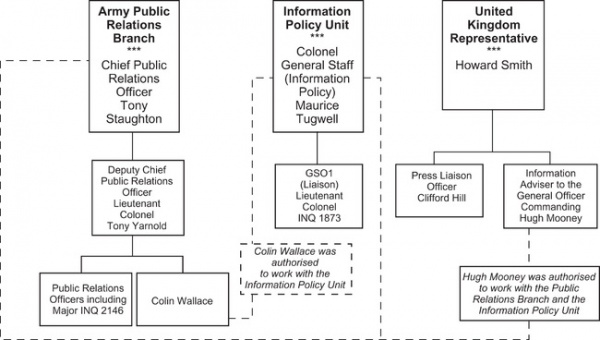Difference between revisions of "Information Liaison Department"
| (4 intermediate revisions by 2 users not shown) | |||
| Line 1: | Line 1: | ||
| − | {{Template:Northern Ireland badge}}The [[Information Liaison Department]] was a part of the psychological operations activity of the British Army in Northern Ireland from around 1970 until it was disbanded and replaced by the [[Information Policy Unit]] in around September 1971. | + | {{Template:Northern Ireland badge}} {{Template:Propaganda badge}} [[Image:Chap181.jpg|600px|thumb|right|Information organisations in Northern Ireland in January 1972]] |
| + | |||
| + | The [[Information Liaison Department]] was a part of the psychological operations activity of the British Army in Northern Ireland from around 1970 until it was disbanded and replaced by the [[Information Policy Unit]] in around September 1971. | ||
According to [[Paul Foot]] in his book ''Who Framed Colin Wallace'': | According to [[Paul Foot]] in his book ''Who Framed Colin Wallace'': | ||
| Line 9: | Line 11: | ||
::2.1 Lieutenant Colonel INQ 1873 was sent to Northern Ireland in October 1970 in order to run the [[Information Liaison Department]]. He was an expert in psychological operations in combat situations [Day 242/7] and was responsible for psychological operations in Northern Ireland under the direction of the [[Commander Land Forces (Northern Ireland)|CLF]] [Day 242/52]. In or about September 1971 the [[Information Liaison Department]] was disbanded and replaced by the [[Information Policy Unit]]. | ::2.1 Lieutenant Colonel INQ 1873 was sent to Northern Ireland in October 1970 in order to run the [[Information Liaison Department]]. He was an expert in psychological operations in combat situations [Day 242/7] and was responsible for psychological operations in Northern Ireland under the direction of the [[Commander Land Forces (Northern Ireland)|CLF]] [Day 242/52]. In or about September 1971 the [[Information Liaison Department]] was disbanded and replaced by the [[Information Policy Unit]]. | ||
| − | ::2.2 Colonel [[Maurice Tugwell|Tugwell]] arrived in Northern Ireland on 30 August 1971 to become head of the Information Policy Unit. INQ 1873 was appointed his deputy. Tugwell said that he was sent to Northern Ireland at short notice because, so [[Michael Carver|General Carver]] told him, there was a crisis in confidence about Army public relations [Day 240/60]. <ref>Bloody Sunday Inquiry [http://www.bloody-sunday-inquiry.org.uk/reports/creports/Archive/CS2-441.pdf CS2 - Closing Submission by Counsel to the Inquiry - Appendix - Military Information Activity in Northern Ireland], 23 November 2004.</ref> | + | ::2.2 Colonel [[Maurice Tugwell|Tugwell]] arrived in Northern Ireland on 30 August 1971 to become head of the Information Policy Unit. [[INQ 1873]] was appointed his deputy. Tugwell said that he was sent to Northern Ireland at short notice because, so [[Michael Carver|General Carver]] told him, there was a crisis in confidence about Army public relations [Day 240/60]. <ref>Bloody Sunday Inquiry [http://www.bloody-sunday-inquiry.org.uk/reports/creports/Archive/CS2-441.pdf CS2 - Closing Submission by Counsel to the Inquiry - Appendix - Military Information Activity in Northern Ireland], 23 November 2004.</ref> |
==Notes== | ==Notes== | ||
<references/> | <references/> | ||
| − | [[Category:Northern Ireland]][[Category:British Army]][[Category:British Propaganda]][[Category:Psychological Warfare]] | + | [[Category:Northern Ireland]] |
| + | [[Category:British Army]] | ||
| + | [[Category:British Propaganda]] | ||
| + | [[Category:Propaganda]] | ||
| + | [[Category:Psychological Warfare]] | ||
| + | [[Category:State Violence and Collusion Project]] | ||
Latest revision as of 16:01, 10 March 2015

|
This article is part of SpinWatch's Northern Ireland Portal. |

|
This article is part of the Propaganda Portal project of Spinwatch. |
The Information Liaison Department was a part of the psychological operations activity of the British Army in Northern Ireland from around 1970 until it was disbanded and replaced by the Information Policy Unit in around September 1971.
According to Paul Foot in his book Who Framed Colin Wallace:
- In 1970 on the orders of the Ministry of Defence, the information department of the Army in Northern Ireland was reorganised. Tony Staughton remained in charge of public relations, with Colin and Colonel Yarnold in support. side by side, a new unit was set up entitled Information Liaison - later Information Policy - commanded by a military officer with the rank of lieutenant colonel. The first of these was Lieutenant colonel Johnny Johnston. He was swiftly replaced by a hard-line paratroop officer, Colonel Maurice Tugwell. Information Policy was a separate unit working for the intelligence services but expected to operate under the cover of public relations. Its function was psychological warfare.[1]
A submission by counsel to the Bloody Sunday Inquiry described the role of INQ 1873 (the designation given to a witness at the inquiry who gave evidence anonymously)[2] in psychological operations as follows:
- 2.1 Lieutenant Colonel INQ 1873 was sent to Northern Ireland in October 1970 in order to run the Information Liaison Department. He was an expert in psychological operations in combat situations [Day 242/7] and was responsible for psychological operations in Northern Ireland under the direction of the CLF [Day 242/52]. In or about September 1971 the Information Liaison Department was disbanded and replaced by the Information Policy Unit.
- 2.2 Colonel Tugwell arrived in Northern Ireland on 30 August 1971 to become head of the Information Policy Unit. INQ 1873 was appointed his deputy. Tugwell said that he was sent to Northern Ireland at short notice because, so General Carver told him, there was a crisis in confidence about Army public relations [Day 240/60]. [3]
Notes
- ↑ Paul Foot Who Framed Colin Wallace?, 1989 London: Macmillan, p. 16
- ↑ C1873 - Statement Of INQ 1873 (pdf) Bloody Sunday Inquiry, 24 March 2003.
- ↑ Bloody Sunday Inquiry CS2 - Closing Submission by Counsel to the Inquiry - Appendix - Military Information Activity in Northern Ireland, 23 November 2004.
